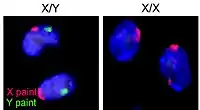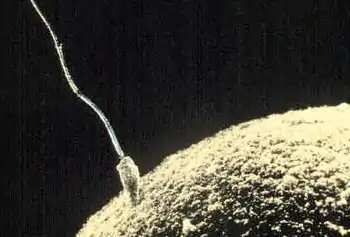Gamete
A gamete (/ˈɡæmiːt/; from Ancient Greek γαμετή gamete from gamein "to marry") is a haploid cell that fuses with another haploid cell during fertilization in organisms that sexually reproduce and possess only one set of dissimilar chromosomes.[1] Gametes are an organism’s reproductive cells, also referred to as sex cells[2].In species that produce two morphologically distinct types of gametes, and in which each individual produces only one type, a female is any individual that produces the larger type of gamete—called an ovum— and a male produces the smaller tadpole-like type—called a sperm. Sperm cells or spermatozoon are small and motile due to the flagellum, a tail-shaped structure that allows the cell to propel and move. In contrast, each egg cell or ovum is relatively large and non-motile.[2] In short a gamete is an egg cell (female gamete) or a sperm (male gamete). Ova mature in the ovaries of females and sperm develop in the testes of males. During fertilization, a spermatozoon and ovum unite to form a new diploid organism.[2] Gametes carry half the genetic information of an individual, one ploidy of each type, and are created through meiosis, in which a germ cell undergoes two fissions, resulting in the production of four gametes.[1] In biology, the type of gamete one produces determines the classification of their sex.[3]
| Part of a series on |
| Sex |
|---|
 |
| Biological terms |
| Sexual reproduction |
|
| Sexuality |
This is an example of anisogamy or heterogamy, the condition in which females and males produce gametes of different sizes (this is the case in humans; the human ovum has approximately 100,000 times the volume of a single human sperm cell). In contrast, isogamy is the state of gametes from both sexes being the same size and shape, and given arbitrary designators for mating type. The name gamete was introduced by the German cytologist Eduard Strasburger.
Oogenesis is the process of female gamete formation in animals. This process involves meiosis (including meiotic recombination) occurring in the diploid primary oocyte to produce the haploid ovum. Spermatogenesis is the process of male gamete formation in animals. This process also involves meiosis occurring in the diploid primary spermatocyte to produce the haploid spermatozoon.
Dissimilarity
In contrast to a gamete, the diploid somatic cells of an individual contain one copy of the chromosome set from the sperm and one copy of the chromosome set from the egg cell; that is, the cells of the offspring have genes expressing characteristics of both the father and the mother. A gamete's chromosomes are not exact duplicates of either of the sets of chromosomes carried in the diploid chromosomes, and may undergo random mutations resulting in modified DNA and subsequently, new proteins and phenotypes.

Sex determination in mammals and birds
Humans and most mammals use the XY sex-determination system in which a normal ovum can carry only an X chromosome whereas a sperm may carry either an X or a Y , while a non-normal sperm cell can end up carrying either no sex-defining chromosomes, an XY pair, or an XX pair; thus the male sperm determines the sex of any resulting zygote. If the zygote has two X chromosomes it will develop into a female, if it has an X and a Y chromosome, it will develop into a male.[4]
For birds, the female ovum determines the sex of the offspring, through the ZW sex-determination system.[4]
Artificial gametes
Artificial gametes, also known as In vitro derived gametes (IVD), stem cell-derived gametes (SCDGs), and In vitro generated gametes (IVG), are gametes derived from stem cells. Research shows that artificial gametes may be a reproductive technique for same-sex male couples, although a surrogate mother would still be required for the gestation period.[5] Women who have passed menopause may be able to produce eggs and bear genetically related children with artificial gametes.[5] Robert Sparrow wrote, in the Journal of Medical Ethics, that embryos derived from artificial gametes could be used to derive new gametes and this process could be repeated to create multiple human generations in the laboratory.[6] This technique could be used to create cell lines for medical applications and for studying the heredity of genetic disorders.[6] Additionally, this technique could be used for human enhancement by selectively breeding for a desired genome or by using recombinant DNA technology to create enhancements that have not arisen in nature.[6]
Plants
Plants which reproduce sexually also have gametes. However, since plants have an alternation of diploid and haploid generations some differences exist. In flowering plants, the flowers use meiosis to produce a haploid generation which produce gametes through mitosis. The female haploid is called the ovule and is produced by the ovary of the flower. When mature, the haploid ovule produces the female gamete which are ready for fertilization. The male haploid is pollen and is produced by the anther, when pollen lands on a mature stigma of a flower it grows a pollen tube down into the flower. The haploid pollen then produces sperm by mitosis and releases them for fertilization.
Notes and references
- "gamete | Definition, Formation, Examples, & Facts". Encyclopedia Britannica. Retrieved 20 October 2020.
- "gamete / gametes | Learn Science at Scitable". www.nature.com. Retrieved 20 October 2020.
- Cotner, Sehoya; Wassenberg, Deena, "8.4 Sex: It's About the Gametes", The Evolution and Biology of Sex, retrieved 20 October 2020
- Jay Phelan (30 April 2009). What Is Life?: A Guide to Biology W/Prep-U. Macmillan. p. 237. ISBN 978-1-4292-2318-8. Retrieved 8 October 2010.
- Newson, A J; Smajdor, A C (2005). "Artificial gametes: new paths to parenthood?". Journal of Medical Ethics. 31: 184–186. doi:10.1136/jme.2003.004986. PMC 1734101. PMID 15738444. Retrieved 26 February 2015.
- Sparrow, Robert (4 April 2013). "In vitro eugenics". Journal of Medical Ethics. 40: 725–31. doi:10.1136/medethics-2012-101200. PMID 23557913. Retrieved 8 March 2015.